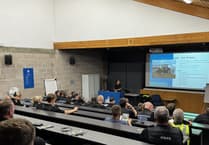CHICHESTER District Council is supporting West Sussex County Council’s efforts to crack down on blue badge fraud.
An estimated one in five blue badges are used illegally, costing the UK economy £46 million each year. Misuse can often cause problems for genuine users, leaving vulnerable people unable to get to their destination.
Thefts of parking permits for disabled motorists have quadrupled in the past four years, figures show.
Some 2,921 blue badges were reported stolen in England in 2016-17, compared with 656 in 2012-13, according to the Department for Transport. The latest annual figure represents a year-on-year rise of 14 per cent.
Around 2.4 million disabled people in England have a blue badge. The badges allow holders to park free of charge in pay and display bays and for up to three hours on yellow lines, while in London they exempt holders from having to pay the congestion charge.
Blue Badges enable people with disabilities or health conditions affecting their mobility to park closer to their destination, such as in dedicated disabled parking bays on street and in car parks, and in other permitted parking bays and single or double yellow lines.
They are a lifeline for their users. People with severe mobility difficulties would struggle to visit shops, access services, and visit friends and family.
As part of a crackdown on misuse across West Sussex, Chichester District Council’s civil enforcement officers are supporting the blue badge team at West Sussex County Council.
Trained investigators have been working with the council’s civil enforcement officers on special enforcement days to detect and retain blue badges that are being used fraudulently.
This approach has been successfully trialled across the UK and in neighbouring districts and boroughs. The council’s civil enforcement officers have also been trained to spot fraudulent blue badges on their daily patrols.
Chichester District Council leader Tony Dignum, said: “Blue badges are meant to help people who are disabled or have limited mobility, but fraud is a big problem which can mean that the people who need them the most suffer.
“By increasing the level of enforcement in the Chichester District, we hope to reduce the problem in our area.
“We understand that the blue badge scheme can sometimes be confusing for users, so I would encourage anyone who is unsure of the rules to speak to the team at West Sussex County Council.”
West Sussex County Council has been working in partnership with Chichester District Council and other district and borough councils to enforce compliance of the blue badge scheme.
As a result, across the county, there have been six successful prosecutions and 80 individuals have attended community resolutions.
Community resolutions are offered as a first-level way of dealing with offences and are formal warnings in which people agree to attend an information session so that the consequences of their actions can be explained.
Amanda Jupp, West Sussex County Council’s cabinet member for adults and health, added: “Blue badge misuse is not only fraud, but can mean that genuine, vulnerable users are deprived of vital services because parking spaces are taken by fraudsters.
“This could include taking spaces near doctors’ surgeries, chemists or other community facilities. ”
Martin Tett, transport spokesman for the Local Government Association representing councils, described the increase in thefts as alarming.
“For disabled people, blue badges are a lifeline that helps them get out and about to visit shops or family and friends,” he said.
“Callous thieves and unscrupulous fraudsters using them illegally are robbing disabled people of this independence.”
In 2016-17, councils in England took legal action against 1,131 motorists for blue badge misuse, up by a quarter on the previous 12 months.
But the figure could be much higher, as two-out-of-five councils said they did not have a policy of launching prosecutions in relation to the issue.
Enforcement of the blue badge scheme only applies to on-street parking.





Comments
This article has no comments yet. Be the first to leave a comment.